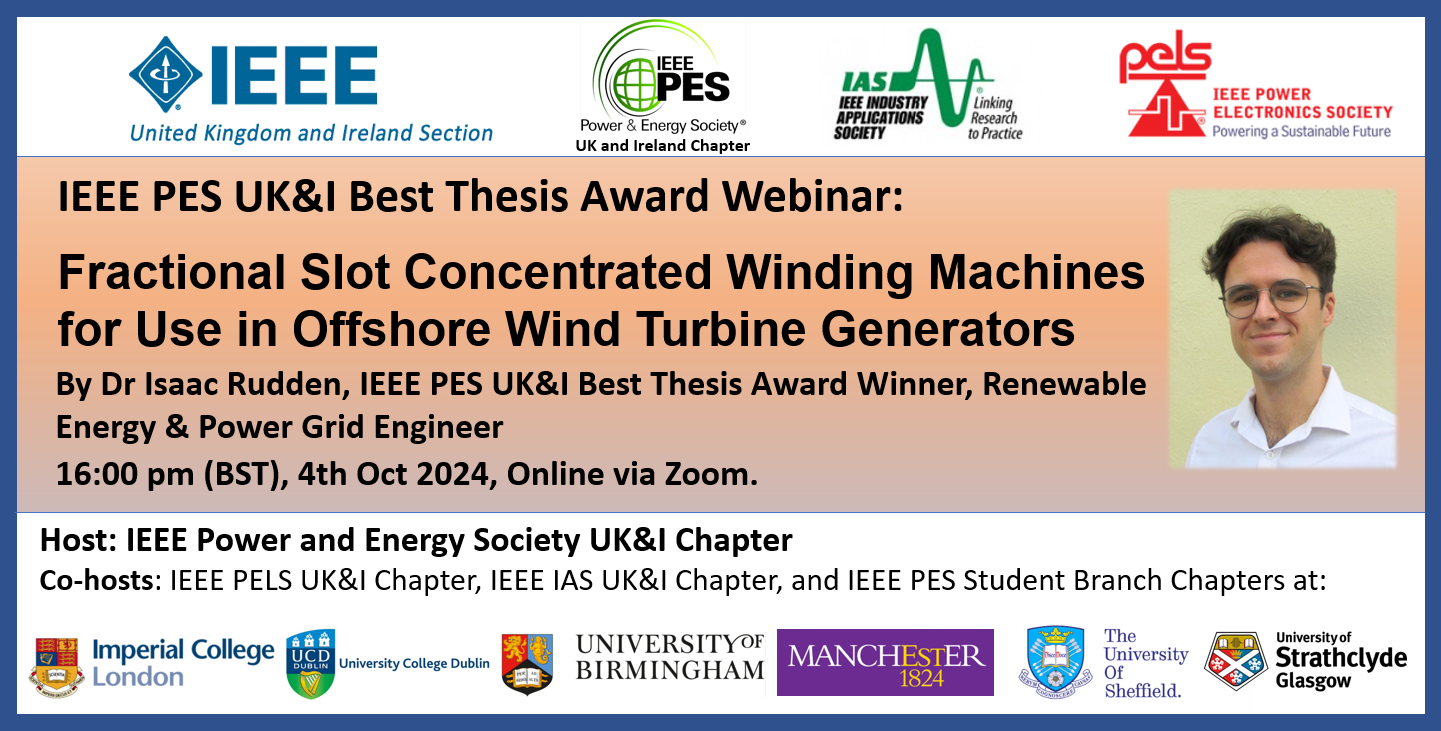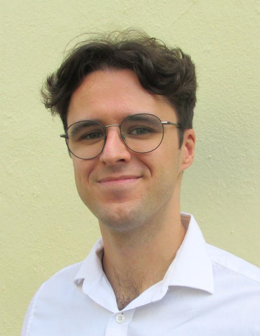IEEE PES UK&I Best Thesis Award Webinar: Fractional Slot Concentrated Winding Machines for Use in Offshore Wind Turbine Generators
IEEE PES UK&I Best Thesis Award Webinar:
Fractional Slot Concentrated Winding Machines for Use in Offshore Wind Turbine Generators
By Dr Isaac Rudden, IEEE PES UK&I Best Thesis Award Winner, Renewable Energy & Power Grid Engineer
16:00 pm (BST), 4th Oct 2024.
Online via Zoom (Meeting link will be sent to registrants before the event).
This webinar investigates methods to improve the effectiveness of machines equipped with fractional slot concentrated windings (FSCW) for use in offshore wind turbine generators. These machines offer many potential advantages over conventional integer slot winding (ISW) machines but suffer from a large number of armature magneto-motive force (MMF) harmonics that induce excess eddy current losses in the rotor and PMs. Furthermore, surface-mounted PM (SPM) machines with FSCW have almost no machine saliency, making them incompatible with sensorless control schemes currently employed in offshore wind turbines. For FSCW to be an attractive alternative for offshore wind turbine generators, these downsides must be mitigated.
This work proposes a novel machine topology that utilises dual multiphase hybrid star-polygonal connected windings to eliminate unwanted MMF harmonics and improve machine torque performance and efficiency. In the particular case of a 3-phase machine, machines with a coil pitch of 1 and 2 are proposed and studied in detail. For the machine with a coil pitch of 1, all harmonics that are not torque producing either directly or through modulation by the stator teeth are eliminated. This results in greater torque performance, flux weakening capability, and efficiency than comparable concentrated winding machines. For a coil pitch of 2, the proposed winding structure is able to completely eliminate both the parasitic 1st subspace harmonic and the largest loss-causing higher order space harmonic such that the rotor and PM eddy current losses are substantially reduced. These machines are also scaled to 3MW and found to be competitive with the conventional ISW topology presently employed in offshore wind turbine generators. Furthermore, the first method for dq-analysis of star-delta wound FSCW machines is developed which allows for these machines to be used with modern control techniques like field oriented and sensorless control in the future. The results of this thesis are validated with analytical modelling, FEA simulations, and experimental measurements of a number of prototypes.
Host: IEEE Power and Energy Society UK&I Chapter
Co-hosts: IEEE PELS UK&I Chapter, IEEE IAS UK&I Chapter, and IEEE PES Student Branch Chapters at:
- University of Birmingham
- University of Manchester
- University of Sheffield
- University College Dublin
- Imperial College London
- University of Strathclyde
The IEEE UK and Ireland PES Chapter is pleased to announce the winner of the ‘Best PhD Thesis Competition Award’ 2024.
Dr Isaac Rudden, IEEE and PES Member, received the highest score after gathering the rubric’s form from the judges and carefully summarising them. Dr Rudden’s submission was selected as the most exceptional entry in this highly competitive event. His thesis entitled: ‘Fractional Slot Concentrated Winding Machines for use in Offshore Wind Turbine Generators’ provides methods to improve the effectiveness of machines equipped with fractional slot concentrated windings (FSCW) for use in offshore wind turbine generators.
To celebrate Dr Rudden’s accomplishment, a well-deserved plaque, will be awarded to him during UK and Ireland PES Chapter AGM to be held at the end of 2024.
Dr Rudden was also invited by the UK and Ireland PES Chapter Committee, to deliver a one-hour webinar to share with our members and the general public the highlights of his thesis. This event will take place on October 4th at 16:00 pm (BST). Looking forward to seeing you then!
Congratulations to Dr Rubben on this incredible accomplishment! His dedication, passion, and talent have set a remarkable standard that should inspire others, and are a shining example of excellence.
Date and Time
Location
Hosts
Registration
-
 Add Event to Calendar
Add Event to Calendar
Loading virtual attendance info...
Speakers
Isaac Rudden
Fractional Slot Concentrated Winding Machines for Use in Offshore Wind Turbine Generators
This thesis investigates methods to improve the effectiveness of machines equipped with fractional slot concentrated windings (FSCW) for use in offshore wind turbine generators. These machines offer many potential advantages over conventional integer slot winding (ISW) machines but suffer from a large number of armature magneto-motive force (MMF) harmonics that induce excess eddy current losses in the rotor and PMs. Furthermore, surface-mounted PM (SPM) machines with FSCW have almost no machine saliency, making them incompatible with sensorless control schemes currently employed in offshore wind turbines. For FSCW to be an attractive alternative for offshore wind turbine generators, these downsides must be mitigated.
This work proposes a novel machine topology that utilises dual multiphase hybrid star-polygonal connected windings to eliminate unwanted MMF harmonics and improve machine torque performance and efficiency. In the particular case of a 3-phase machine, machines with a coil pitch of 1 and 2 are proposed and studied in detail. For the machine with a coil pitch of 1, all harmonics that are not torque producing either directly or through modulation by the stator teeth are eliminated. This results in greater torque performance, flux weakening capability, and efficiency than comparable concentrated winding machines. For a coil pitch of 2, the proposed winding structure is able to completely eliminate both the parasitic 1st subspace harmonic and the largest loss-causing higher order space harmonic such that the rotor and PM eddy current losses are substantially reduced. These machines are also scaled to 3MW and found to be competitive with the conventional ISW topology presently employed in offshore wind turbine generators. Furthermore, the first method for dq-analysis of star-delta wound FSCW machines is developed which allows for these machines to be used with modern control techniques like field oriented and sensorless control in the future. The results of this thesis are validated with analytical modelling, FEA simulations, and experimental measurements of a number of prototypes.
Biography:
Isaac Rudden received an MEng degree in new and renewable energy engineering from Durham University in 2020. In 2024 he completed a PhD degree in electronic and electrical engineering at The University of Sheffield. His research was focused on the electromagnetic design and control of electrical machines for offshore wind power applications, and he hopes to pursue a career in renewable energy.



